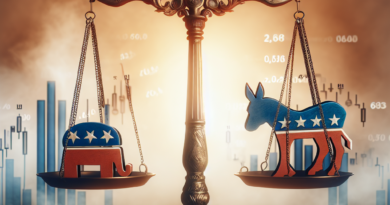Three Imminent Risks to the Stock Market: How to Safeguard Your Investments
“`html
Understanding the Stock Market’s Hidden Risks
The stock market often serves as a critical indicator of economic health, yet it conceals pitfalls that even seasoned investors may overlook.
Recently, the S&P 500 index experienced a rally, leading many to believe the worst is behind us, fueled by positive retail sales data and signs of moderate inflation.
However, several potential threats could upend this optimistic outlook and trigger new declines.
In this article, we will delve into three serious risks looming over the stock market.
Awareness of these scenarios is essential in order to safeguard investments in an environment that may soon become tumultuous.
1) No Rate Cuts in September
A primary driver affecting the stock market is the Federal Reserve’s monetary policy.
In recent months, investors have anticipated that an interest rate cut was inevitable, thus bolstering markets despite mixed signals regarding the economy.
Yet, there is growing concern that this expectation might be overly optimistic.
Real-time interest rate forecasts can be monitored on CME Group.
According to Brian Mulberry, a portfolio manager at Zacks Investment Management, there’s a tangible possibility that the Fed may choose to hold rates steady in September instead of proceeding with the anticipated monetary easing.
Such a decision could destabilize the market, as many investors have already built rate cut expectations into asset prices.
The Consumer Price Index from July revealed apparent stability, yet certain areas indicated persistent and irregular inflation.
Additionally, recent retail sales data showcased surprising resilience among American consumers, suggesting that the economy may not require further monetary stimulus in the short term.
Should the Fed opt to maintain rates, it may signal that the economy is robust enough to withstand further interventions.
Conversely, this could be interpreted as caution from the central bank, which may prefer to preserve monetary ammunition for future downturns.
Thus, a failure to cut rates could trigger a wave of selling in the stock market, leading to significant corrections.
2) Political Uncertainty Surrounding U.S.
Presidential Elections
Political uncertainty stands as another critical factor that could negatively impact the stock market in the coming months.
With the U.S.
presidential elections on the horizon, there is the potential for results to be so close that a winner may not be declared on election night, reminiscent of the 2000 race involving George W.
Bush.
Such a deadlock, where election results could be contested and persist for days or even weeks, poses a substantial risk to financial markets.
Ken Mahoney, CEO of Mahoney Asset Management, has expressed concerns about the potential for an unclear presidential outcome on November 6.
The memory of the 2000 elections, which required a recount in Florida, remains vivid for many investors.
A contested or uncertain election could increase market volatility, as political uncertainty is historically linked to heightened risk aversion.
In an electoral environment fraught with uncertainty, investors may feel compelled to liquidate portions of their portfolios, thus amplifying downward pressure on stock prices.
Additionally, the election results could shape future economic and fiscal policies, further compounding uncertainties for financial assets.
Although current predictions suggest a probable victory for Kamala Harris, the volatility tied to the campaign and the possibility of a disputed outcome remain threats that ought not be underestimated.
3) Potential Economic Hard Landing
Finally, one of the most serious yet less discussed risks is the prospect of a hard landing for the U.S.
economy, a threat often underestimated concerning risk assets.
After years of sustained economic expansion and a cycle of interest rate increases, the economy might be headed towards a sharper slowdown than previously anticipated.
Arthur Budaghyan from BCA Research has recently cautioned that the Fed’s monetary easing may not suffice to support risk assets if economic growth were to decelerate significantly.
A hard landing, characterized by a significant yet not catastrophic slowdown, could severely impact the stock markets.
In such a scenario, demand for risk assets like stocks might drastically decline, leading to reduced prices and increased volatility.
This concern is particularly acute given that markets currently reflect elevated valuations based on continual growth expectations and unwavering monetary support.
If economic growth were to slow beyond forecasts and the Fed lacked the capability to introduce sufficient countermeasures, investors may face substantial losses.
Moreover, should a hard landing occur, the Fed might find itself with limited maneuverability, having already lowered interest rates to historically low levels.
This would diminish the efficacy of future monetary policies to combat potential recessions, leaving markets more vulnerable to market forces.
As such, a hard landing represents a tangible and significant threat to investors, who may need to reevaluate their investment strategies in a context of increasing economic uncertainty.
Protecting Your Investments
For investors, diversifying portfolios in light of the U.S.
presidential elections is vital for capital protection.
The political uncertainty surrounding this event could indeed induce strong market fluctuations, rendering excessive exposure to the U.S.
market risky.
A prudent strategy involves reducing the weight of U.S.
investments and focusing on European or emerging markets, which are less susceptible to the dynamics surrounding U.S.
elections.
Incorporating Italian government bonds or those from other Eurozone countries can provide stability, while maintaining a portion of liquidity allows for prompt reactions to any market upheavals.
Diversifying into less cyclical sectors or tangible assets such as real estate can also help mitigate risks.
Constantly monitoring global economic and political developments is crucial for adapting your investment strategy to evolving circumstances, ensuring a balanced and resilient portfolio.
With a careful and thoughtful approach, it is possible to protect investments from the uncertainties of the global market.
“`




